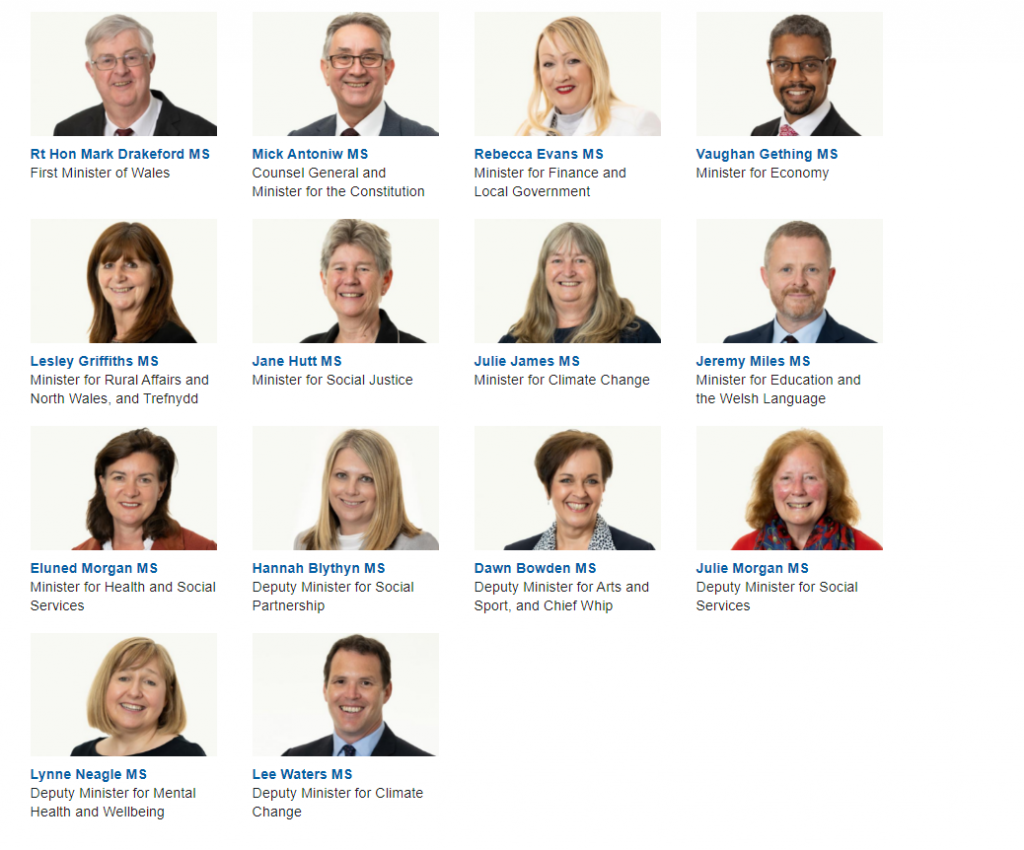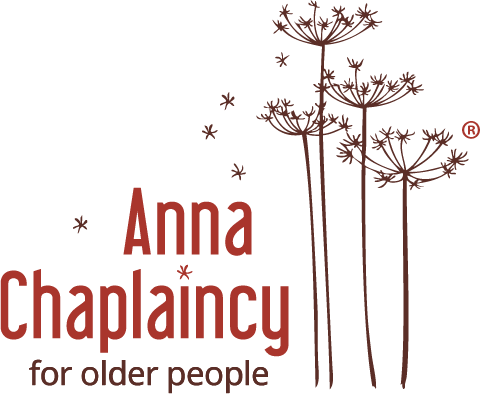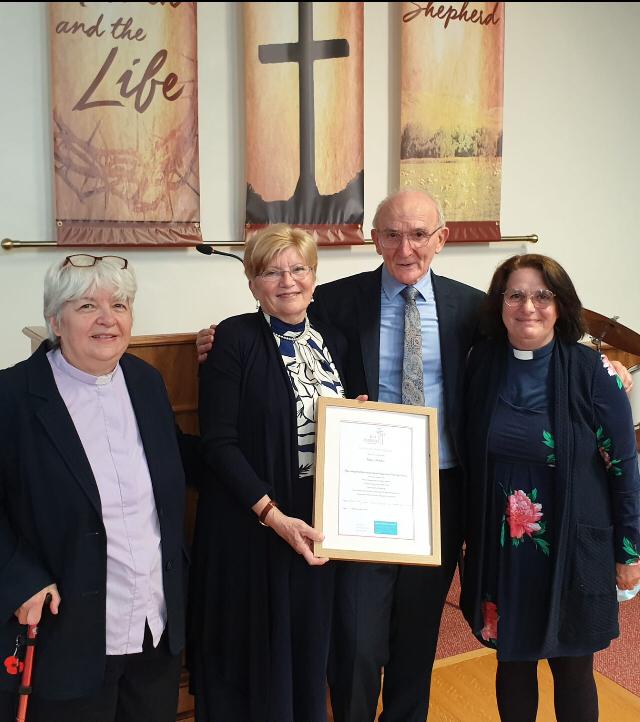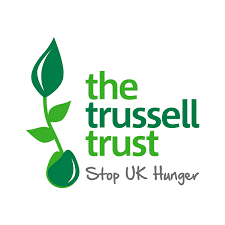NEW GOVERNMENT FOR WALES FOCUSED ON CLIMATE CHANGE AND SOCIAL JUSTICE

Picture: Welsh Government https://gov.wales/cabinet-members-and-ministers Contains public sector information licensed under the Open Government Licence v3.0
In announcing the names of the members of the new Welsh Government following the May 2021 election, the First Minister, Mark Drakeford MS, emphasised that the first priority would be Wales’s recovery from the Covid-19 pandemic. However, he also decided to re-shape the government to give greater emphasis to two long-term priorities, viz. the climate and nature emergencies, and social justice.
Prior to the announcement, the public affairs officers of a number of Cytûn member denominations had written to Mr Drakeford to congratulate him and to suggest (amongst other things) the pursuit of these two priorities. While those churches would not wish to claim credit for the decision, they do welcome it.
The priority given to climate change and the biodiversity crisis is demonstrated by creating a completely new department in Welsh Government, bringing together areas of responsibility previously scattered across other departments. In brief, they are:
- Housing, infrastructure and planning
- Digital connectivity, urban regeneration and town centres, allotments and urban green infrastructure (Welsh Government has a target of 30% remote working post pandemic, with work hubs in smaller towns throughout Wales to reduce commuting into the big cities)
- Transport and active travel
- Marine and freshwater planning, biodiversity, conservation and licensing
- Land policy (although agriculture remains under the Minister for Rural Affairs)
- Energy policy (small and medium scale energy production and energy efficiency)
- Emission reduction targets and carbon budgets
- Natural Resources Management and forestry policy
- Mitigation and adaptation in relation to climate change, including water; land drainage; flood and coastal risk; and control of marine and air pollution
- Biodiversity policy, protection and management of wildlife
- Sustainable resource and waste management
- Local environment quality, including litter, fly-tipping, noise policy and regulation
- National Parks (but tourism remains part of the Economy portfolio)
The new Minister is Julie James MS with Lee Waters MS as Deputy Minister. Welsh Government will continue to be restricted by the devolution settlement, which reserves to Westminster decisions around large-scale energy generation, railway infrastructure, property rights and international trade – including the new trade agreements being negotiated post-Brexit – which means that some key policy levers are not under Welsh Government control.
The coming Senedd term will see bills being brought forward for Agriculture, Fisheries, and Environmental Principles and Governance, to supersede the temporary powers for Welsh Ministers contained in Westminster’s post-Brexit legislation on these topics (the Welsh legislation having been postponed due to Covid). A Clean Air Bill will also be introduced in 2022 following the recent White Paper.
The second area prioritised is Social Justice, with Jane Hutt MS as Minister and Hannah Blythyn MS as Deputy Minister. Their portfolio will include (in summary):
- Co-ordination of cross-cutting measures to promote prosperity and tackle poverty
- Digital and financial inclusion, including credit unions and the Community Bank of Wales
- Welfare Reform
- Wales and Africa programme
- EU Settlement Scheme
- Equality and Human Rights
- Co-ordination of issues relating to Gypsies, Roma and travellers, asylum-seekers, refugees and community cohesion
- Anti-slavery, domestic abuse, gender-based violence and sexual violence
- The voluntary sector and volunteering
- Justice, offending, prisons and the police (to the extent that they are devolved)
- Lead responsibility for monitoring Post Office and Royal Mail matters in Wales
- Relationship with the Older People’s Commissioner for Wales, Children’s Commissioner for Wales, and Future Generations Commissioner for Wales.
- Social Partnership and Public Procurement Bill
- Living Wage and Fair Work
Cytûn will follow developments in these two new departments with great interest, and will be keen for the churches to have a voice. We will also monitor, on behalf of our member churches and organisations, legislation and policy in other areas, such as education (see p. 5) and the Welsh language; health and social care; and the arts and culture.
WESTMINSTER GOVERNMENT’S NEW PROGRAMME
It is unusual for the Welsh and UK governments to announce new programmes at the same time, but that happened following the Senedd election on May 6 and the Queen’s Speech at Westminster on May 11. On May 20, the UK Government announced its Plan for Wales 2021.
The UK Government’s programme shares with the Welsh Government’s programme a priority on Covid-19 recovery and a commitment to tackling climate change – though the UK Government makes much less mention of the biodiversity crisis. Plan for Wales 2021 emphasizes the UK Government’s role in investing in industries that can help with decarbonisation and technological mitigation of the impact of climate change. The plan also refers to the work of the UK Government in other areas within its responsibilities, such as rail, Welsh language broadcasting (through S4C and the BBC), and the contribution of the defence industry to the Welsh economy.
Notably absent from the UK Government’s programme is any reference to social justice. There is information about UK funds that are gradually replacing European Union funds that were previously spent in Wales, but the emphasis is on their role in boosting the economy, infrastructure and employability. The Cytûn Working Group on Wales and Europe received information about and discussed these funds at its meeting on May 24. Considerable concern was expressed at the lack of consultation with agencies currently in receipt of these grants (such as, amongst Cytûn members, the Salvation Army in particular) and also with the wider third sector and the Welsh Government. The UK Government intends to give local authorities a special role in applying for these funds, and individual Westminster MPs will also have an influence on the allocation, raising concerns about partisan influence on spending.
The Queen’s Speech included a preview of a number of laws that will be introduced there that will be of interest to churches in Wales. These include:
- Reform of the Mental Health Act, both with regards to detention and to the treatment of people with autism and learning disabilities.
- Establishing the Advanced Research and Invention Agency (ARIA) for the promotion of technological research, amending the Government of Wales Act to ensure that it is responsible solely to the UK Government.
- Continuing the process of introducing new regulations following leaving the EU, introducing UK-wide arrangements for managing public subsidies for business, public procurement rules and recognizing professional qualifications. These all relate to devolved matters, and may test the competence of both Parliaments following the passing of the UK Internal Market Act 2020.
- Introduce a bill to make it illegal to impede oil supplies (for example through protest), and continue the Police, Crime, Sentencing and Courts Bill which will (among many other things) give more powers to police to stop or limit protests affecting the public.
- Prevent public authorities (other than the UK Government) from introducing policies to boycott or disinvest from particular countries or industries.
- New legislation on immigration to the UK, restricting the right to seek asylum for those who have travelled via other safe countries and restricting appeals following refusals.
- Bills to improve the security of the individual online, and protect the telecommunications system from external threats.
- Leasehold reform – a longstanding bone of contention in Wales – following a report by the Law Commission. There was a similar pledge in the Welsh Labour Manifesto for the Senedd, so the two pieces of legislation will need to be co-ordinated.
- A bill restricting the circumstances in which judicial review of decisions by public authorities may be sought.
- A bill requiring the production of an identification document in order to vote, and a bill restoring the Prime Minister’s ability to call a Westminster General Election without requiring a Parliamentary vote.
Cytûn will monitor these and other Westminster bills relevant to Wales on behalf of the churches.
Mavis Martin pioneers Anna Chaplaincy in Bridgend

Mavis Martin has been commissioned as the new Anna Chaplain in Bridgend, and the first Anna Chaplain for the Pentecostal denomination, The Assemblies of God, who have recently joined Cytûn.
Anna Chaplaincy provides a way of supporting older people emotionally and spiritually. Anna Chaplains are named after the widow, Anna, who appears with Simeon in Luke’s gospel chapter 2; both are good role models of faithful older people. Anna Chaplains are there for people of strong, little or no faith at all.
The Anna Chaplaincy Lead in Wales, the Revd Sally Rees, joined Mavis’ family and well-wishers in the congregation at her local church, Emmanuel Christ Church, Bridgend (pictured below with Revd Hilary Pritchard, hospital chaplain, and pastor Vernon King).

‘It was wonderful to be with Mavis Martin for her commissioning as Anna Chaplain for Bridgend,’ said Sally. ‘She was commissioned by her pastor, Vernon King. I gave the address, preaching on Mark 12:42–44 – the story of the widow’s mite.It was all a marvellous celebration of Anna Chaplaincy ministry. Her church family are very warm and supportive,’ said Sally.
Mavis moved from Belfast to South Wales in 1972. She has always had a love and concern for those who are vulnerable and excluded from society in general. In recent years, having volunteered in the chaplaincy team in her local hospital, she developed ‘an absolute passion for the elderly and especially those walking their journey with dementia. As a Dementia Champion God opened doors for me to visit care homes in Bridgend doing “craft & communion” sessions in addition to the Brain & Soul sessions with the hospital chaplain.’ The chaplain introduced Mavis to Anna Chaplaincy. She finally began online training this year, with the support of her pastor and her local church, and is delighted to have been commissioned as Anna Chaplain in Bridgend.
‘I believe that I am now in the perfect will of God for my life and that the most effective way of showing his love to our precious elderly generation is by serving them as an Anna Chaplain.’
The Anna Chaplaincy Prayer
Faithful God, you have promised in Christ to be with us to the end of time.
Come close to those who have lived long and experienced much.
Help them to continue to be faithful and, within the all-age kingdom of God,
to find ways to go on giving and receiving your grace, day by day.
For your glory and your kingdom. Amen
New listening service for carers
Carers Wales is launching a new, bilingual emotional support service for unpaid carers. The new telephone Listening Support Service will offer unpaid carers a chance to chat to someone who understands the challenges of caring. With many carers stating that during the pandemic they have felt “abandoned”, “set adrift” and expected to “get on with it” with little or no support, this will offer a much-needed space for carers to take time out to talk to someone who understands.
Carers can register for the service online here. The trained callers will then make a series of phone calls to the carer, providing emotional support and a listening ear, to support the carer wherever they are in their caring journey.
The service has received Welsh Government funding to March 2023.
CONSULTING AGAIN ON EDUCATION IN WALES
With September 2022 – the start date for the new schools curriculum for all children up to year 7 in Wales – there is much work still to be done.
On May 21 the Welsh Government launched no fewer than eight consultations about detailed guidance and codes needed to implement the curriculum. Two of the eight areas are ones with which Cytûn and our member churches and organisations have been closely involved over the last few years.
The draft guidance for planning and teaching Religion, Values and Ethics guides teachers on how to approach the teaching of Christianity (recognized in the Curriculum and Assessment (Wales) Act as the principal religious tradition in Wales), other religions and non-religious convictions (such as humanism). In future, this will be done not only in specific lessons, but as part of a much more coherent curriculum, devised by each local school based on the syllabus of Religion, Values and Ethics adopted by the county’s Agreed Syllabus Conference. That Conference includes representatives of the local education authority, teachers and religious and philosophical groups on the basis of their local strength.
We very much welcome the guidance on offering children “rich experiences” within this subject, and the first two suggestions for such experiences are:
- engage with religious and non-religious local communities, in ways that learners will enjoy and remember
- engage in role play and participate in, or observe, activities such as celebrations or re-enactments (p. 21 of the consultation document)
This offers churches (and other religions and movements) a unique opportunity to engage with their local schools to offer support and facilities for nurturing such experiences.
The draft code and guidance for Relationships and Sexuality Education offer guidelines on how to teach these sensitive topics. Again, this will happen not only in lessons dedicated to the subject, but across the curriculum. It is pleasing to see in this draft some references to the importance of religious beliefs and communities in forming understanding in these areas, and to the importance of nurturing mutual respect and a willingness to understand different beliefs.
The other six consultations relate to:
- Educating very young children through play before reaching the formal curriculum
- A curriculum for private nursery settings
- Careers and work related experiences
- Draft Progression Code
- A code for What Matters Statements – the core statements for each area of the curriculum
- Cross-curricular skills frameworks (numeracy, literacy, digital competence)
During the passage of the Curriculum and Assessment Bill (which became the Act) through the Senedd, Cytûn worked closely with our member churches and organisations to bring about a number of changes. These included:
• Ensuring that non-religious belief groups did not have a disproportionate voice on Statutory Advisory Councils for Religious Education or in the Agreed Syllabus Conferences
• Recognising the status of the Trust Deeds of church schools in guiding their Religion, Values and Ethics curriculum
• Ensuring ongoing consultation with religious groups when formulating the curriculum.
Cytûn’s member churches and organisations will no doubt wish to study these drafts carefully and respond to them by the deadline of 16 July 2021, and individuals – including children, parents and members of the public – can also express their views.
95% OF THOSE REFERRED TO FOODBANKS ARE DESTITUTE

Trussell Trust, the largest Foodbank network in the UK, widely supported by member churches of Cytûn, has released a new report which reveals the extreme poverty faced by people at food banks going into the pandemic. Across the UK, people referred had just £248 a month on average to survive after housing costs. That money needs to cover energy and water costs, council tax, food, and other essentials.
This new report is part of State of Hunger, the largest ever study into hunger and food bank use in the UK. Carried out by researchers at Heriot-Watt University, it is helping to understand the scale of hunger and destitution in the UK and learn how we can work together to build a hunger free future.
Emma Revie, Chief Executive of the Trussell Trust, said, “We know we can change this. We need to change the conversation around poverty and take action together. We need Government at all levels to commit to ending the need for food banks once and for all and to develop a plan to do so. It’s time for government to make this a priority – to recognise that it must be an essential part of their levelling up agenda to work towards a hunger free future where we can all afford the basics.”
PLEASE REGISTER YOUR CLIMATE SUNDAY BEFORE SEPT 5
With the key COP26 international climate change conference in Glasgow approaching in November, now is a key time for churches to show how much they care about God’s creation. The Climate Sunday partnership of churches and Christian organisations across Britain and Ireland is urging congregations who have not already held their service to set a date now.
Member of the Climate Sunday Steering Group, Gethin Rhys, said, “Glasgow Cathedral is booked for a major live-streamed service of worship on the afternoon on September 5th, in which we will tell UK Government how many churches have joined in, so even if you intend to hold your service after that date, please register your service before September 5th, so that we can count you in!”
Gethin added, “Your Climate Sunday service should include an opportunity to commit to doing what you can to improve your own immediate environment as a congregation, through EcoChurch or Live Simply, and also an opportunity to sign the common declaration The Time is Now, led by the Climate Coalition of many organisations across society. Churches may also wish to add their voice to the Climate Cymru movement here in Wales.” There is a wealth of worship material in Welsh and English, and much more information, on the Climate Sunday website.
CONTACTING CYTÛN’S POLICY OFFICER
Please note that in the period May 27 – July 4 Gethin is completing his sabbatical study leave (partly postponed due to Covid) and also taking a short holiday, so will not be available to deal with correspondence or queries.
Parch./Revd Gethin Rhys – Swyddog Polisi/Policy Officer
Cytûn – Eglwysi ynghyd yng Nghymru/Churches together in Wales
Registered office: Room 3.3, Hastings House, Fitzalan Court, Cardiff CF24 0BL
Working at home during the emergency period. Mobile: 07889 858062
E-mail: gethin@cytun.cymru www.cytun.co.uk @CytunNew
Hapus i gyfathrebu yn Gymraeg ac yn Saesneg.
Happy to communicate in Welsh and English
Cytûn is a registered company in England and Wales | Number: 05853982 | Registered name: “Cytûn: Eglwysi Ynghyd yng Nghymru/Churches Together in Wales Limited” | Cytûn is a registered charity | Number: 1117071
Publication date: 26 May 2021. The next Bulletin will be published on 21 July 2021.
